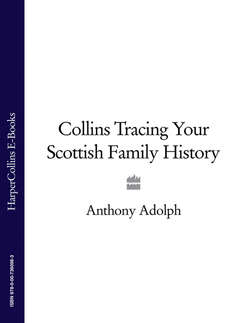Читать книгу Collins Tracing Your Scottish Family History - Ryan Tubridy, Anthony Adolph - Страница 11
Original records
ОглавлениеOriginal records are usually held in the archives of the organization that created them, or in public repositories, local or national. As it is not always practical to visit an archive, there are other options:
1. The Church of Jesus Christ of Latter-day Saints, also called the Mormon Church, has an ever-growing archive of microfilm copies of original records from all over the world, including Scotland, many of which are indexed on the Mormon website www.familysearch.org. Founded in 1830, the Utah-based church has a religious mission to trace all family trees, and they hold ceremonies that allow the deceased to become Mormons, should their souls desire. They have Family History Centres (FHCs) in most major towns: find your nearest at www.familysearch.org. FHCs are open to all – entirely without any compunction to convert – and here you can order any microfilms to be delivered from the Mormon’s Family History Library in Utah.
2. Many Scottish records have been published, as indicated where appropriate in this book, especially by the Scottish History Society (SHS) www.scottishhistorysociety.org and the Scottish Record Society (SRS) www.scottishrecordsociety.org. Volumes can be bought, examined in genealogical libraries, or ordered through interlibrary loan.
General Register House, Princes Street, Edinburgh, where the ScotlandsPeople Centre is housed.
3. You can hire a genealogist or record agent. Genealogists like myself charge higher fees and organize and implement all aspects of genealogical research. Record agents charge less and work to their clients’ specific instructions, for example: ‘Please list all Colquhouns in the Old Parochial Registers of Oban between 1730 and 1790’. Most archives have a search service, or a list of local researchers. Many advertise in genealogy magazines or at www.genealogypro.com, www.expertgenealogy.com and www.cyndislist.org, and some belong to the Association of Scottish Genealogists and Researchers in Archives, www.asgra.co.uk, whose members charge a minimum rate of £20 per hour, though membership does not guarantee quality. The NAS website has links to some genealogists on www.nas.gov.uk/doingResearch/remotely.asp.
Most professionals are trustworthy, and many offer excellent services, though ability varies enormously. Generally, the more prompt and professional the response, and neater the results, the more likely they are to be any good. Hiring help is not ‘cheating’: if you only want one record examined but are not sure it will contain your ancestor, it makes no sense to undertake a long journey when you can pay someone a small fee for checking for you, and a local searcher’s expertise may then point you in the right direction anyway.
4. By using the ScotlandsPeople Centre in Edinburgh and its website. In the ‘Old Days’, the only way to trace Scottish family history was to go to New Register House, Edinburgh, and search the indexes to births, marriages and deaths (from 1855), and the censuses (currently from 1841 to 1901), and then walk round to the National Archives of Scotland to examine the Old Parochial Registers (that can go back to the 1500s) and testaments (also from the 1500s).
